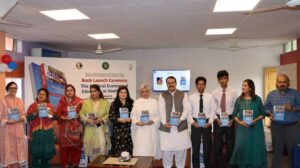While participating in a conference on Mapping the Educational Reforms in View of the Next Democratic Tenure, senior members of different political parties of Pakistan called for measures to introduce educational reforms and groom the people, particularly the youth to become a responsible citizenry.
Social Justice (CSJ) in collaboration with Idara-e-Taleem-o-Aagahi (ITA) and Human Rights Commission of Pakistan (HRCP) had jointly organized the event. While participating in the conference, independent education policy experts, stakeholders, and political parties agreed on introducing reforms for more inclusive and equitable quality education.
Speaking on the occasion, Dr. Baela Raza Jamil, CEO Idara-e-Taleem-o-Aagahi said education with learning is a lifeline for all citizens without discrimination. Pakistan remains lowest on key indicators of SDG 4 in South Asia failing to live up to Article 25-A, a fundamental constitutional right to education. In Spite of progressive manifestos, political parties repeatedly fall short of delivering what they promised, compromising, excluding, and crippling the lives of millions of children, especially girls and marginalized groups.
May the coming elections be a new beginning for progressive education investment and delivery for all citizens protected with strong learning foundations.
Dr. A. H. Nayyar said that the state has failed to implement the Article 25-A and provide free and compulsory education to all children under 16 years as nearly half the children are deprived of schooling on account of the failure of the state to provide the resources needed for the task. The political parties must promise in their election manifestos to enhance allocation to education by 6% of GDP.
Dr. Shoaib Suddle said that the government has been violating order no. 2 of the Jillani judgment (SMC 1 of 2014, etc.) and Article 22(1) of the constitution because school curriculum and textbooks of compulsory subjects like Urdu, English and Social Studies carry substantial content relating to the religious instruction of majority religion, compelling non-Muslim students to learn Islamiyat in all courses. Peter Jacob, Executive Director, Centre for Social Justice said that fulfilling and implementing Articles 22 (1) and 25-A of the Constitution of Pakistan on the right to education without discrimination, is a fundamental constitutional obligation and a pressing need for improving foundational literacy, and the quality of education. He added that civil society will continue to engage effectively with political parties for positive educational reforms before and after the elections in 2023. Wajahat Masood appreciated the landmark decision of the supreme court issued on 19 June 2014. He added that it is not possible to implement articles 20, 22 (1), and 25-A of the constitution in letter and spirit unless related laws and policies are made likewise, as they are sectarian, religion-based, and discriminatory. He added the state of Pakistan needed to ensure the equality of citizens and discourage appeasing groups promoting division on the basis of identity. Dr. Prof. Yaqoob Khan Bangash said that there has to be social interaction among students from majority and minority communities inside and outside classrooms to promote inclusion, pluralism, and diversity. Waseem Ajmal Chaudhry, Federal Secretary, Ministry of Federal Education & Professional Training assured that the ministry was committed to removing religious instruction and hate speech present in compulsory subjects to implement Article 22(1) of the Constitution.
Source: Pakistan Observer




